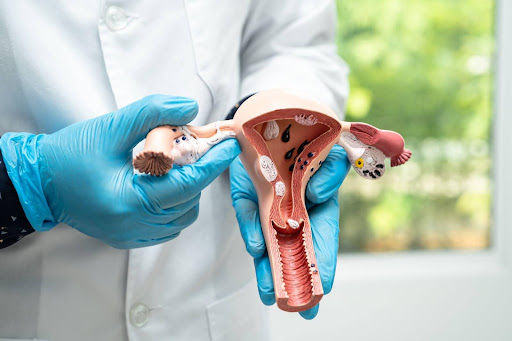
Surgical Menopause: Panacea or Problem?
What is Surgical Menopause?
While natural menopause typically occurs around the age of 50, some women experience it at earlier ages due to surgical interventions, known as surgical menopause. The surgical intervention includes removal of delinquent ovaries or uterus resulting in sudden cessation of ovarian hormone production and onset of menopausal symptoms. Through this blog, let’s explore the intricacies of surgical menopause, its causes, symptoms, risks, and treatment options.
In the childbearing age, when ovaries are surgically removed, the procedure is called oophorectomy which is usually bilateral (which means both ovaries are removed at the same time). This is often accompanied by the removal of the uterus and is termed as hysterectomy. Mind that both procedures are independent and can be done separately. Unlike natural menopause, which is a gradual decline of female hormones, surgical menopause is an abrupt and immediate drop in the hormonal levels and so are its symptoms… more intense and bothersome!
Why to Perform Surgical Menopause? What are the Reasons?
Several medical conditions and circumstances in women’s lives may necessitate the removal of ovaries and uterus, the vitals of their body, leading to surgical menopause. Some of the causes include:
Endometriosis
A chronic condition in which the lining of the uterus (endometrium) grows outside of the uterus. Indeed it causes significant pain and complications, a doctor may recommend the removal of the uterus to reduce the pain and it leads to surgical menopause.
Genetic Disorders
If a woman is at high risk of genetic cancers (examined by the presence of BRCA1 and BRCA2 mutations), she may opt for prophylactic surgical operations to reduce the risk of cancer. By doing this, the development of cancer in the ovaries, uterus, and breasts can be abridged significantly.
Cancers in Ovaries, Uterus, and Cervix
In a condition where cancer has made progress in ovarian, uterine, and cervical tissues, surgical removal is one of the options to prevent the spread of the cancerous cells.
Benign Tumors
Persistent ovarian or uterine cysts may often pose a health risk and consequently, necessitate a surgical intervention. While such benign tumors are just the outgrowth and are non-cancerous, their size and location can cause significant discomfort and complications.
Pelvic Inflammatory Disease
It’s a kind of infection in the female reproductive organs. This can cause harm to the ovaries to the extent that their removal becomes necessary to prevent further health issues.

Cancer Treatments
A woman diagnosed with ovarian, cervical, or uterine cancers at an early age has to go through radiation and chemotherapy. They eventually damage and disrupt their vitals, impairing hormone production and potentially leading to the sudden onset of menopause.
PCOS/PCOD
Severe cases of PCOS/PCOD such as endometrial hyperplasia or cancer may lead to the worsening of ovarian or uterine health and doctors have to opt for certain surgical treatments, which can lead to surgical menopause.
How is Life after Surgical Menopause?
Life after surgical menopause could be a significant transition, from a balanced ovarian hormonal cycle to a sudden drop (majorly estrogen), often resulting in more severe and rapid onset of menopausal symptoms than those experienced during natural menopause.
This brings about various physical, emotional, and daily lifestyle changes:
Hot Flushes
The first and foremost symptoms are hot flushes which are the intense episodes of heat and sweating in the upper body, disrupting day-to-day activities and sleep as well. It is frequently experienced multiple times a day.
Night Sweats
It is a specific type of hot flush that occurs at night with more profuse sweating than hot flushes during the daytime.
Mood Swings
The abrupt hormonal imbalance leads to mood instability and causes anxiety and depression. Women at this time have an intense surge of emotions, irritability, feelings of extreme sadness, loneliness, and hopelessness.
Insomnia
Declined estrogen levels adversely affect the biological clock and thermoregulation (regulation of body temperature), leading to difficulty in sleeping and such prolonged sleeplessness causes insomnia.
Cognitive Disturbances
Women also experience memory lapses and difficulty concentrating, often termed “brain fog”. These cognitive impairments affect daily women’s productivity and quality of life.
Vaginal Dryness
Sudden reduction in estrogen levels causes thinning and drying of the vaginal linings, leading to discomfort and pain during sexual intercourse. It increases the chances of vaginal infection.
Fragile Bone
Estrogen plays a pivotal role in maintaining bone health, its abrupt loss leads to a rapid decrease in bone density, increasing the risk of osteoporosis and fractures.
Decreased Libido
Due to hormonal changes, sexual desires get badly affected and impact the intimate relationship. Painful intercourse due to dryness in the vagina is also a cause for decreased libido.
Fatigue
Women with surgically operated ovaries and uterus feel persistent tiredness and low energy levels.
Are there any Risks Associated with Surgical Menopause?
Surgical menopause is a necessary medical intervention and it also commences various risks and long-term health implications.
Metabolic Changes
Sudden hormonal deprivation due to surgical menopause results in a changed metabolism of the body and suffers from weight gain. Experiencing women reported difficulties in maintaining a healthy weight after this operation.
Cardiovascular Diseases
Like in menopause, surgical menopause more rapidly increases the risk of cardiovascular diseases due to estrogen deficiency. It includes heart attacks and strokes. Since estrogen has cardioprotective activity, its absence makes women more susceptible to heart diseases.
Osteoporosis
Decreased bone density because of decreased estrogen levels heightens the risk of fractures and osteoporosis. The majority of the women suffer from joint pain which is a key concern, as osteoporosis can lead to significant morbidity and poor quality of life.

Sexual Dysfunction
Vaginal dryness, decreased libido, and discomfort during sexual intercourse affect the sexual health and relationships. This boosts anxiety and leads to the feeling of inadequacy and strain.
Psychological Impact
Surgical menopause brings abrupt changes in hormone levels which significantly impacts emotional and psychological health. If the surgery is being done at an earlier age, women may struggle with the loss of fertility and emotional consequences.
How long does Surgical Menopause last?
Unlike natural menopause which is gradual, surgical menopause typically starts immediately after the surgery. Very soon, the symptoms also get started; however, the duration and intensity of menopausal symptoms may vary widely among individuals.
Short-term Symptoms
Right after surgery, the initial phase starts which particularly may be intense with symptoms like hot flushes, night sweats, vaginal dryness, and mood swings. Sometimes, this phase is known as an acute phase that can last up to several weeks and months.
Long-term Symptoms
While some symptoms may diminish over time, many of them persist for several years including hot flushes, vaginal dryness, and mood swings. The persistence of these symptoms gives birth to cardiovascular diseases, obesity, and osteoporosis.
What are the Treatments Available for Surgical Menopause?
Managing surgical menopause requires a multifaceted approach to alleviate niggling symptoms and mitigate long-term health risks. Some of the treatments available are:
Hormone Replacement Therapy (HRT)
HRT is the administration of hormones (estrogen-only and combined hormone therapy) to the body that is no longer produced by the ovaries in adequate amounts during normal/ surgical menopause. It helps reduce the symptoms like hot flushes, night sweats, mood swings, sleeplessness, hypertension, anxiety, vaginal dryness, and painful intercourse.
Non-hormonal Therapy
Other than hormonal therapy, various non-hormonal drugs for instance antidepressants including SSRIs, gabapentin, and clonidine are being prescribed to manage penetrating hot flushes, mood swings, and depression.
Mind and Body Practices
Some practices like acupuncture, massage, reflexology, and aromatherapy are also being taken by women to avoid the harmful effects of hormonal and non-hormonal therapies.

Lifestyle Modifications
Taking a balanced diet rich in nutrients, vitamins (especially vitamin D), and proteins supports bone health and healthy skin.
Regular Exercise
Incorporating weight bearing and muscle strengthening exercises in daily routine makes stronger bones, a healthier heart, and improved mood.
Stress Management
Doing yoga and meditation practices helps reduce stress and anxiety, improves overall well-being, and brings positivity.
Regular Health Monitoring
It includes regular check-ups of bone density, heart health, metabolic and psychological changes, and their monitoring.
Should diet for Surgical Menopause be Focused?
A balanced diet with a lot of nutrients is crucial for maintaining health and managing the intense symptoms after surgical removal of the ovaries and uterus. The sudden loss of ovarian hormones affects various aspects of health including bone density, cardiovascular health, and metabolism.
A balanced diet that may help the body through the immediate transition may include:
- Milk, yogurt, leafy vegetables and almonds. They are a rich source of calcium which helps strengthen the bones.
- Vitamin D helps in calcium absorption and sources are fish, milk, and sunlight exposure.
- Sources of unsaturated fats and omega-3 fatty acids include fish, nuts, seeds, and olive oil. They are good for heart health.
- The diet should also be inclusive of whole grains, fruits, vegetables, and legumes as they are rich sources of fiber. Fiber-rich food helps lower cholesterol levels and supports digestive health.

Key Takeaway
Surgical menopause, a life-altering transition with substantial physical, emotional and psychological repercussions. While the immediate onset of menopausal symptoms can be challenging, understanding the causes, symptoms, risks, and treatment options is essential for managing the symptoms effectively and sustaining a quality life with more productivity. If you are going through surgical menopause, it is important to work closely with your doctor to make a personalized management plan that addresses your unique needs and health goals.
Citations
- Australian Menopause Society (2018). Surgical menopause. Retrieved from https://www.menopause.org.au/images/stories/infosheets/docs/AMS_Surgical_Menopause.pdf
- British Menopause Society (2022). Surgical menopause: A toolkit for healthcare professionals. Retrieved from https://thebms.org.uk/wp-content/uploads/2023/01/13-BMS-TfC-Surgical-Menopause-JAN2023-A.pdf
- Best Practice and Research Clinical Obstetrics and Gynaecology (2022). The Surgical menopause. Retrieve from https://www.sciencedirect.com/science/article/abs/pii/S1521693422000402

Poonam Rawat





